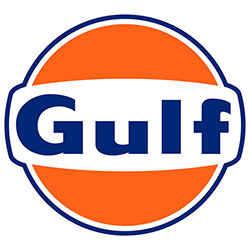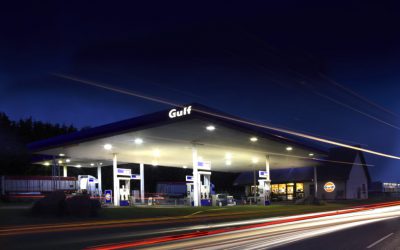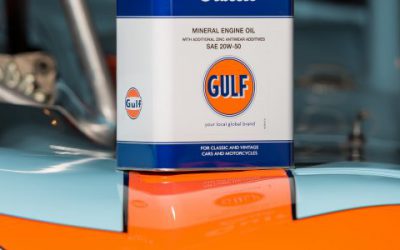In 1974 Dermot Dowling had already ignited a passion for petrol retailing when he set up Petrocell Holdings. 42 years later and now into his 70s, Dermot no longer takes on the day to day running of the company but, as Chairman, remains an active force within the business. The engine of Petrocell Holdings is now Managing Director, Alan Spackman, ably supported by Financial Director, Elaine Reed and Dermot’s two sons, John and Pat.
At 57, Alan, who left school at 17 and went straight into the industry, is a relative spring chicken by comparison to his Chairman. This ‘old school’ duo, with 80-plus years of collective petrol retailing experience, know a thing or two about forecourt operations. Petrocell Holdings now has a £32million turnover and its portfolio includes 10 filling stations, six of which are supplied by Certas Energy under the Gulf brand.
With a tried and trusted formula, the Croydon-based Top 50 Indie company is always on the look-out for new sites but its business model is not built on numbers and there is no rush to compete with the major groups.
“We tend towards multi-asset locations that could include MOT bays, car repairs and accessories,” explains Spackman. “It’s not something that would appeal to the MFG’s of this world but it works for us. We know how to get the best out of these sites, it’s the type of place and not necessarily the geographical fit, as evidenced by the miles that I clock-up each year!”
The majority of the Petrocell forecourts are located within easy access of the M25, although there are sites in Devon, East Anglia and Milton Keynes. All are managed operations and the business generates an annual throughput of 22million litres, with shop sales totalling over £10million.
“We are still very hands-on and prefer this style of operation,” continues Spackman. “We put the ground work in to get the best out of every element of our business. That includes understanding the customer base in depth and establishing strong and lasting relationships in the locality.”
The company’s flagship site is the Gulf-branded Lady Lane Service Station in Hadleigh near Ipswich. An impressive 5million litre outlet with a 250sq metre Londis convenience store that generates sales of £30k a week. The site regularly features as a finalist at SuperStation, Certas Energy’s forecourt standards awards, was a category winner in 2014 and continues to offer the very highest standards of customer service.
“Our staff at Lady Lane are a dedicated and very successful team that sets the bar in everything it does,” enthuses Spackman. “The site is located in an affluent, rural market town and the business has been geared towards this audience. Our staff know their customers well and there is always a good rapport on site.”
Petrocell encourages all of its forecourt staff to understand their community and engage with customers. They are thoroughly trained, supported and encouraged to shine.
“Many of our staff have been with us for decades,” says Spackman. “We are all for continuity, its good for business and important to our customers. We always look after the right people, they make the difference and we never underestimate their value.”
“We work with people who we trust and are proud of our solid relationships, built on mutual respect. It’s a fundamental principal that extends from our staff to our suppliers.”
“Our relationships with Gulf, Harvest, Londis and Tokheim are testament to this. Gulf, our principal fuel provider, is now supplying around 17million litres a year. We placed three more sites in its capable hands last year because we know its people will support us and work with us to get the best out of our forecourts. The deal is competitive, the brand is strong and there is a flexibility in the partnership that will serve us well over time. Just as important to us is Steve Caley, Certas Energy’s Area Manager, who we have known for over 20 years. He is experienced, industry savvy and we trust him to be there in good times and in bad.”
Alan considers the marketplace to be more dealer-friendly than at any time in the past 20 years. Nevertheless, the battle to improve margins and tackle escalating overheads continues.
“Just as you get to grips with the utilities and pretty much eliminate stock losses, another Heath and Safety directive will impact upon us or, as happened recently, the government introduced statutory pensions and increased the living wage.”
“All of our sites have Automatic Temperature Compensation (ATC) pumps, sophisticated stock monitoring and the latest energy-efficient LED lighting. Health and Safety is now such a minefield that we have to involve a third party expert such as Suresite. And then there is the ‘no win, no fee brigade’, opportunists that from nowhere, like the unregulated hand car wash operators, seem able to impact upon our revenues without any meaningful accountability.”
“On a positive note, the change in consumer behaviour that now results in consumers enthusiastically shopping on a local forecourt has dramatically improved the fortunes of the petrol retailer and long may it continue. It has been a saving grace as margins erode in many other areas. Imagine legislation to unbrand cigarettes coming into play in the early 1980’s; it could have signalled the end for many forecourts but today its impact is less significant. Tobacco products are low margin items and their importance within the overall mix has diminished as we all become better shopkeepers. We anticipate a drop in tobacco sales come May but, with no brand awareness, it should enable us to stock a reduced range of products.”
Nine of Petrocell’s ten forecourt shops are supplied by Londis and Alan has welcomed the acquisition of Booker by Tesco.
“It can only be a good move. Tesco is the UK’s leading retailer in size and sophistication and we expect the merger to lower prices and open up new revenue streams. We will also be able to utilise its unrivalled experiences.”
Looking to the future, Alan remains optimistic that Petrocell Holdings will continue to prosper.
“We have a proven business model and a strong team with a good balance of vitality and experience. Today we have 10 freehold forecourts, when it has suited us in the past we’ve had more and also operated others on licence from the majors. We prefer a natural progression, influenced by the ebb and flow of the industry. In an environment that is always full of surprises, we may not be able to look too far ahead but I do know we shall continue, wherever possible, to keep things simple and uncomplicated and that long term business relationships will remain at the heart of our business.”



